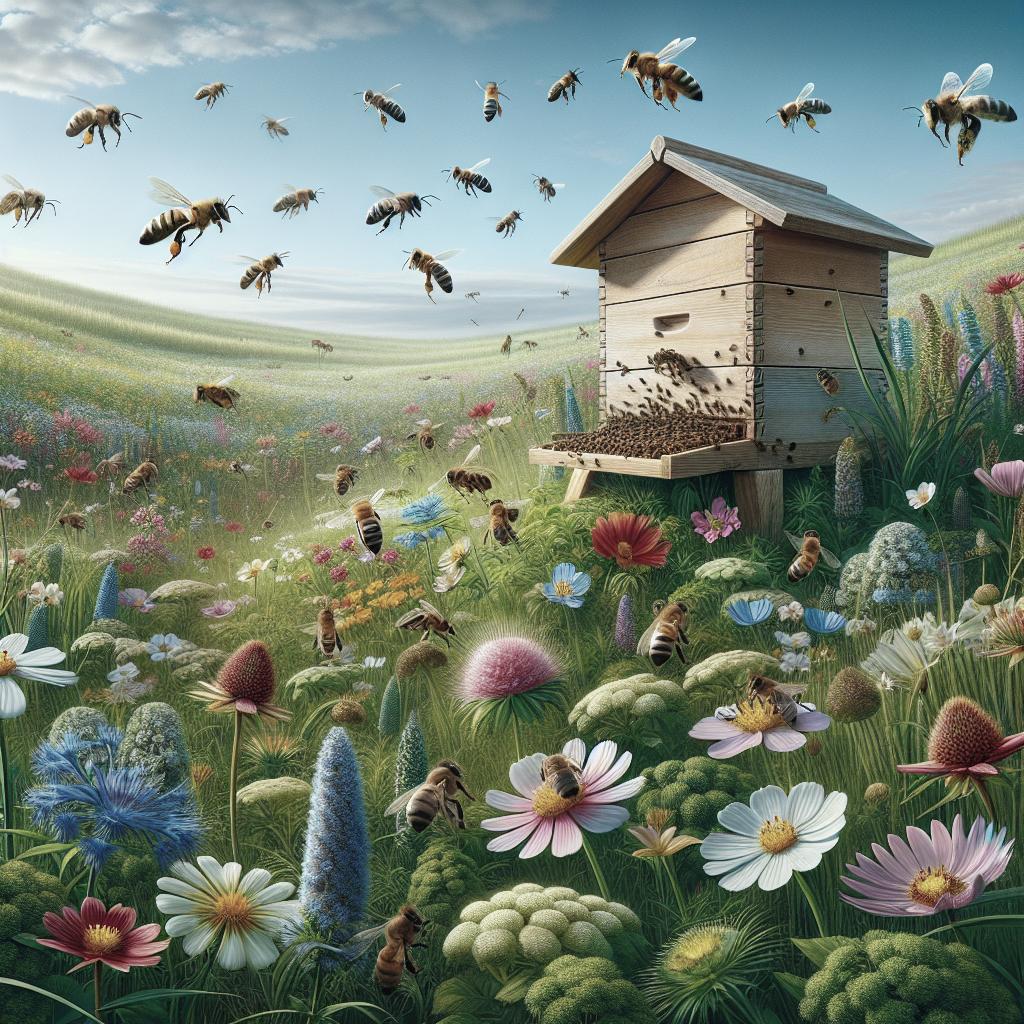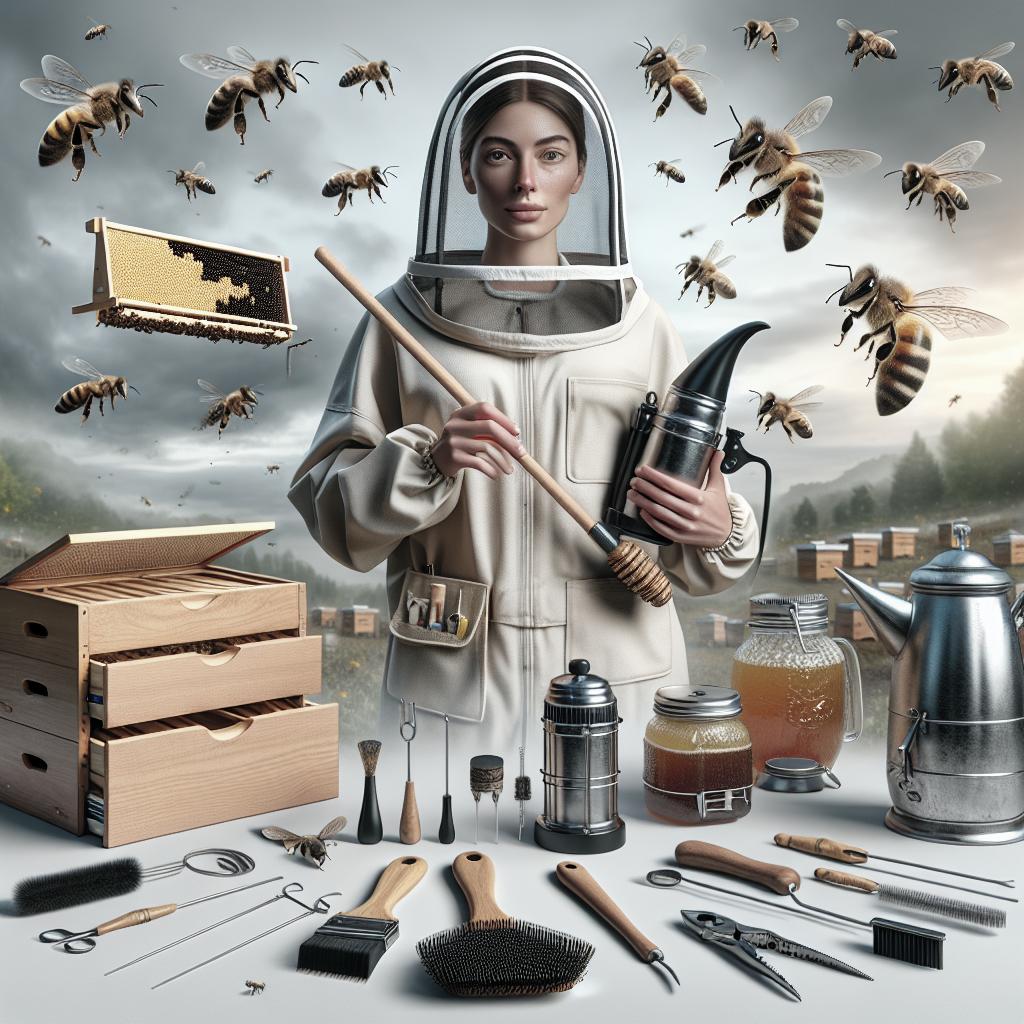The Environmental Benefits of Beekeeping
Beekeeping offers a wealth of benefits to the environment, local economies, and personal well-being. This blog explores why beekeeping is a rewarding endeavor not only for the beekeeper but for the planet at large. From enhancing garden health to promoting environmental sustainability, beekeeping serves as a bridge between humanity and nature, offering insights into the vital role bees play in our ecosystem. Whether you’re interested in becoming a beekeeper for financial reasons, the associated mental and physical benefits, or out of an inherent love for bees, this endeavor promises a journey of continuous learning and profound environmental impact.
Beekeeping: A Rewarding Endeavor for All
Beekeeping is much more than a hobby; it’s a rewarding venture that benefits both the beekeeper and the environment. At its core, beekeeping is about nurturing a crucial species that plays a vital role in pollination and, by extension, global food production. By starting your own apiary, you are actively contributing to maintaining biodiversity and the ecological balance.
The practice of beekeeping also brings people back in touch with nature. As technology consumes more of our lives, beekeeping offers a hands-on approach to understanding and respecting natural processes. In this way, beekeeping is gratifying not only for the honey it may yield but also for the conservation efforts it supports.
The Passionate Beekeeping Community
One of the most enriching aspects of taking up beekeeping is becoming part of a passionate and knowledgeable community. This global fellowship of beekeepers ranges from hobbyists to professionals, and they’re always eager to share experiences, tips, and insights that enrich the practice. These connections can become invaluable as you advance in your beekeeping journey.
Engaging with the beekeeping community, you’ll find countless online forums, social media groups, and local clubs where discussions about bees, hives, and honey flow freely. These platforms offer a shared space to troubleshoot challenges, celebrate successes, and stay informed about the latest in beekeeping research and innovations.
We Need Bees
The importance of bees in our ecosystem cannot be overstated. Bees are essential pollinators for many of the food crops that we rely on daily, including fruits, vegetables, and nuts. Approximately one-third of the food we consume depends on pollinators, particularly bees. Without them, our grocery store shelves would look drastically different, and our agriculture systems would struggle to cope.
Bees also contribute to the health of the planet by supporting the growth of trees, flowers, and other plants, which serve as habitats and food sources for diverse wildlife. Their pollination activities ensure an ongoing cycle of regeneration and sustainability, highlighting the urgent need to protect and support bee populations.
Bees Need Us
Despite their importance, bees are facing numerous challenges, primarily due to human activities. Habitat loss, pesticide use, and climate change are all contributing to declining bee populations worldwide. As responsible citizens, we must take action to support and safeguard these invaluable creatures.
Beekeeping can serve as a proactive response to help counter these threats. By establishing hives and fostering healthy colonies, beekeepers contribute to the repopulation and stabilization of local bee populations, creating environments where bees can thrive.
You Can Make Money
Beekeeping can be a lucrative venture for those who are dedicated to the craft. While the initial investment is modest, the returns can be significant, especially when one diversifies the products derived from the hive. Honey is the most common and marketable product, with demand often outstripping supply in local markets.
Moreover, beekeepers can expand their income sources by selling beeswax, royal jelly, and propolis, or by offering pollination services to local farms. As the popularity of organic and artisanal products grows, many beekeepers find that their home-produced honey and related goods fetch premium prices.
You’ll Never Stop Learning
Beekeeping is a dynamic field, where weather patterns, bee behavior, and technological advancements continually evolve. As a beekeeper, you’ll find yourself on a perpetual learning curve, keeping you engaged and mentally agile. Each season presents different challenges and opportunities to deepen your understanding of bee biology and ecology.
Continued education can come from reading books, attending workshops, or even young courses in entomology or environmental science. For those who embrace the challenge, it’s a lifestyle that invites constant growth and exploration.
The Rewarding Experience
There’s an undeniable sense of reward in witnessing the fruits of your labor as a beekeeper. From the production of the first batch of honey to seeing your bee colonies thrive and expand, each milestone offers a sense of accomplishment that is both personal and profound.
In addition to tangible products, beekeeping fosters a deeper appreciation for the interconnectedness of nature. As you become more attuned to the behaviors and needs of your bees, you develop a greater understanding of the natural world, enhancing your environmental consciousness.
It’s Inexpensive
Starting a beekeeping venture doesn’t require substantial investment, making it accessible to many. Basic equipment includes a hive, protective clothing, a smoker, and some bees, most of which are durable and require minimal replacement. Bees themselves are efficient workers, turning nectar into honey with relatively low overhead costs.
After the initial setup, the primary ongoing costs include feeding and occasional equipment maintenance, but these are manageable for those committed to the practice. Often, with increased yields and expanding hives, beekeeping can very quickly pay for itself.
Boosts Mental Well-Being
Beekeeping provides an excellent form of stress relief, often compared to meditation or yoga. Observing the calm diligence of bee colonies encourages mindfulness and promotes a sense of tranquility. The routine tasks associated with hive management offer a therapeutic escape from the routines of modern life.
Nurturing bees affords a sense of purpose and accomplishment, while the inevitable challenges allow beekeepers to develop problem-solving skills and resilience. This rewarding hobby has been linked to improvements in mental health and overall well-being.
Enhances Garden Health
Beekeeping can significantly amplify the vibrancy and productivity of your garden. Bees are efficient pollinators, and their presence can lead to healthier plants and more bountiful yields of fruits and vegetables. Gardens teeming with bees often see increased blooms and ecosystem diversity.
Moreover, beekeepers are more likely to plant pollinator-friendly varieties and eliminate pesticide use, enhancing the ecological health of their surroundings. Thus, your apiary becomes a catalyst for a miniature ecosystem, buzzing with life and productivity.
Promotes Environmental Sustainability
By taking up beekeeping, you are actively contributing to environmental sustainability. Bees play a crucial role in pollinating many of the crops we rely on, supporting food security and biodiversity. By maintaining healthy bee populations, beekeepers help ensure these essential ecological processes continue.
Beyond pollination, beekeeping encourages sustainable farming practices and reduces the reliance on chemical pesticides. The ripple effect of such practices extends beyond your apiary, influencing broader community attitudes toward conservation.
It’s Physically Engaging
Beekeeping is not only mentally stimulating but also physically engaging. It involves regular outdoor activities, such as inspecting hives, harvesting honey, and maintaining equipment, which can contribute to overall physical fitness. These tasks involve lifting, bending, and walking, making beekeeping a perfect way to stay active.
The physical engagement paired with the fresh air and natural surroundings can also have profound health benefits, promoting cardiovascular health and increasing stamina. For many, beekeeping offers an ideal mix of light exercise and enjoyment.
Promotes Healthy Eating
One of the immediate benefits of beekeeping is access to pure, unprocessed honey. As a natural sweetener, honey is rich in antioxidants, vitamins, and minerals, offering numerous health benefits. This liquid gold can replace processed sugar in many recipes, promoting a healthier lifestyle.
Furthermore, owning a hive encourages an awareness of the health impacts of food choices, often leading beekeepers to adopt more sustainable and nutritious eating habits. This shift not only benefits individual health but also aligns with broader efforts to promote environmental health.
Helps Local Economy
Beekeeping supports local economies by fostering community trade and entrepreneurship. Selling hive products such as honey, beeswax, and pollen can bolster local markets and encourage a buy-local movement. Local farms and gardens benefit from the pollination services bees provide, ensuring robust yields and supporting agricultural livelihoods.
Moreover, as interest in apiculture grows, beekeeper supply stores, educational courses, and bee conservation tourism emerge as new economic opportunities, creating jobs and sustaining community interests.
You Get to Share the Love
Beekeeping is a joy that’s meant to be shared. Whether gifting jars of honey to family and friends, conducting school workshops, or participating in community fairs, beekeeping opens paths for interaction and education. Sharing your passion can inspire others to appreciate and advocate for bees and the environment.
This communal sharing extends beyond personal connections, as engaging in conversations about bees helps raise awareness about their plight, influencing larger conservation efforts. Together, these shared experiences can sew a community that values and supports its natural world.
| Theme | Summary |
|---|---|
| Beekeeping: A Rewarding Endeavor for All | Beekeeping is fulfilling, supporting bees’ habitats, and maintaining ecological balance. |
| The Passionate Beekeeping Community | Beekeepers form a global community, promoting shared knowledge and collective growth. |
| We Need Bees | Bees are essential pollinators, supporting food production and biodiversity. |
| Bees Need Us | Beekeeping counters bees’ environmental threats, aiding their population recovery. |
| You Can Make Money | Beekeeping can be lucrative through honey sales and other hive products. |
| You’ll Never Stop Learning | The dynamic nature of beekeeping offers constant learning opportunities. |
| The Rewarding Experience | Witnessing hive success provides personal satisfaction and environmental awareness. |
| It’s Inexpensive | Launching a beekeeping venture has minimal costs with potential self-sustainability. |
| Boosts Mental Well-Being | Beekeeping offers relaxation, resilience, and improved mental health. |
| Enhances Garden Health | Beekeeping boosts plant vitality and yield through effective pollination. |
| Promotes Environmental Sustainability | Maintaining bee populations supports ecological stability and sustainable practices. |
| It’s Physically Engaging | Beekeeping promotes physical activity and health through engaging outdoor tasks. |
| Promotes Healthy Eating | Owning bees encourages healthier food choices and the use of natural honey. |
| Helps Local Economy | Hive products and services bolster local economies and agricultural yields. |
| You Get to Share the Love | Beekeeping allows for communal sharing, advocacy, and environmental education. |


